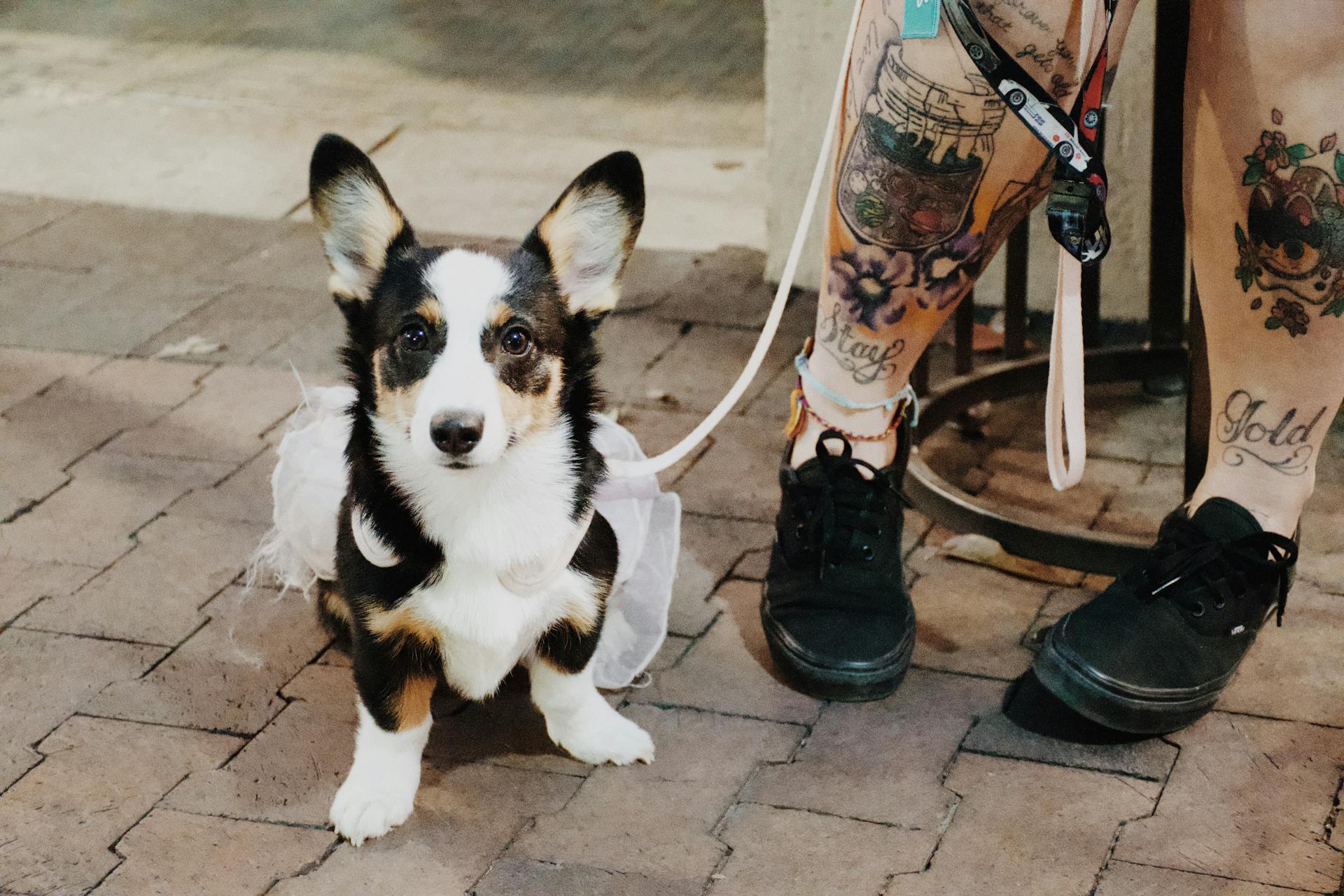
Corgis can be a great addition to families with kids, but it's essential to consider their temperament and needs. They are generally good with children, but it's crucial to socialize them properly from an early age.
Corgis are intelligent and active dogs that require regular exercise and mental stimulation. Without proper care, they can become destructive or develop behavioral problems.
Socialization is key when introducing a corgi to kids. With proper training and supervision, corgis can thrive in families with children.
Corgi Personality
Corgis are known for being happy, loving, and intelligent, but they can also be a bit stubborn at times. They like to think for themselves and may not always do what you want them to do.
One of the most important things to remember about corgis is that they love to eat and can become obese if their food intake isn't moderated. This means you'll need to keep a close eye on their diet to ensure they stay healthy.
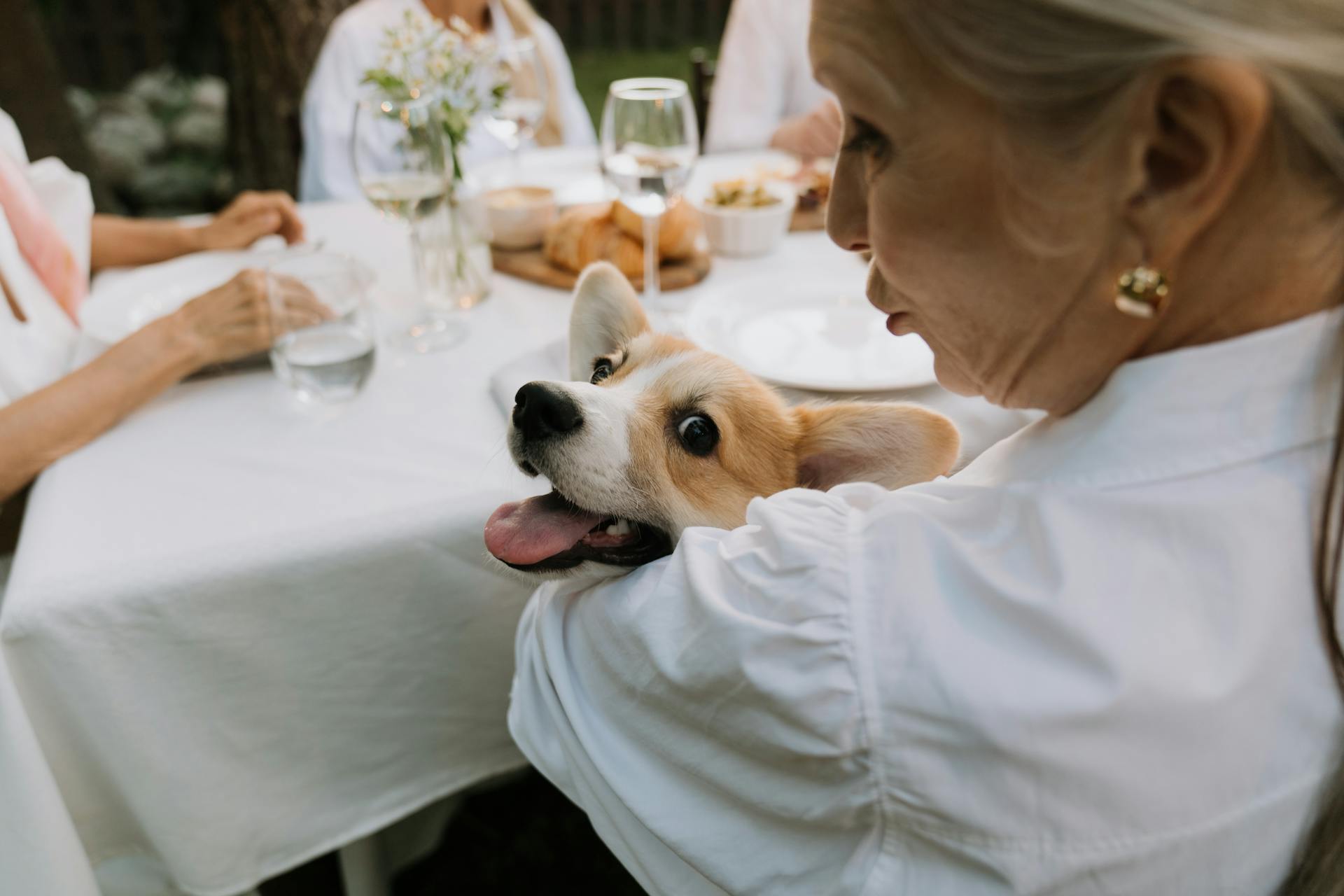
Corgis are incredibly devoted to their human companions and form strong bonds with their families. They're not just loyal to one person, but to everyone in the household.
Their intelligence and alertness make them excellent watchdogs, barking to alert their owners of any potential intruders or unusual occurrences. Despite their small size, they're not afraid to speak up and protect their family.
Corgis have a unique sense of humor and playfulness, which can be entertaining to watch. They'll often entertain their owners with their quirky antics and playful nature.
It's essential to remember that corgis can be a bit stubborn, especially if they think they have a better idea on how things should be done. With patience and consistent training, you can manage this aspect of their personality and help them become a well-behaved member of the family.
Curious to learn more? Check out: Are Corgis Good for First Time Owners
Corgi Care and Training
Corgis are quick learners and thrive on structure and consistency. They're intelligent dogs that can grasp commands and concepts swiftly, making them a joy to train.

One of the most important things to remember when training a Corgi is to use positive reinforcement. Harsh punishment or scolding can be counterproductive and lead to behavioral problems.
Exercise is also a vital component of any Corgi training regimen. Regular outings and exercises that provide mental stimulation are necessary to manage their boundless energy.
Training
Training a Corgi requires patience, consistency, and positive reinforcement. They're quick learners, but can be stubborn at times, so harsh punishment is not the way to go.
Pembrokes are social dogs and need early socialization to become well-adjusted and confident adults. Exposing them to various people, animals, and environments from a young age is crucial.
Corgis are high-energy dogs that need regular exercise and mental stimulation. Interactive games, puzzle toys, and challenging tasks can provide the outlets they need to manage their boundless energy.
Consistency is key when training a Corgi. They thrive on routine and clear boundaries, which helps prevent behavioral problems.
Broaden your view: Good Gun Dogs
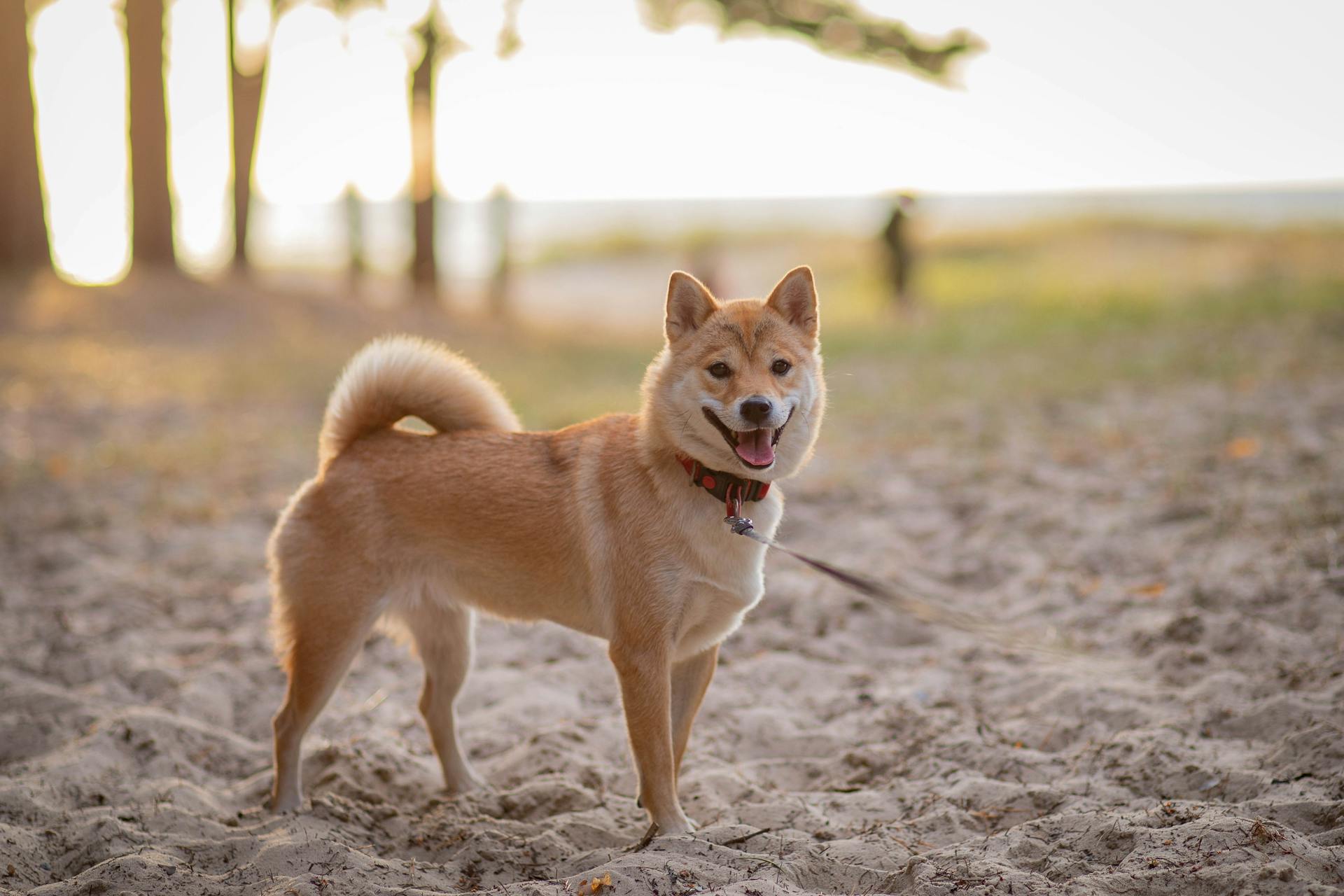
Pembroke Welsh Corgis are intelligent dogs that can learn advanced tricks and commands with ease. They're eager to please their pack and love to be involved in training.
Crate training can be a useful tool for housebreaking and provides a safe space for the puppy. It's also essential for teaching basic obedience skills and providing regular exercise and play sessions throughout the day.
Pembrokes love to learn and benefit greatly from training at a young age. Exposing them to different puzzles, scenarios, and commands is very enriching and sets them up for success in life.
Exercise
The Pembroke Welsh Corgi is a high-energy breed that requires regular exercise to stay happy and healthy.
Exercise is a fundamental necessity for this breed to ensure their physical and mental well-being.
Daily walks and playtime are a must, as they need to burn off their excess energy.
A short, stout body may make them seem like small dogs, but they have a surprising amount of energy and vitality.
For another approach, see: Do Corgis Need a Lot of Exercise
Corgi Pet Ownership

Corgis are a great match for families with kids. They have a remarkable affinity for children and are eager learners, but they do need to be trained out of herding instincts that can lead to nipping at kids' feet or ankles.
Pembrokes are adaptable to living in smaller spaces, but they still require daily periods of exercise to stay healthy and fit. This means daily walks, playtime, and games of fetch are a must.
Their high energy levels and playful nature make them a joy to be around, and their unwavering loyalty forms deep and unbreakable bonds with their human companions.
Pet Ownership
Pembroke Welsh Corgis are naturally athletic dogs that require plenty of exercise each day. This can be achieved with daily walks, playtime, and games of fetch.
Their short legs and long backs make them prone to fractures if they're expected to jump up or down from high surfaces. So, it's essential to keep them safe by avoiding such activities.
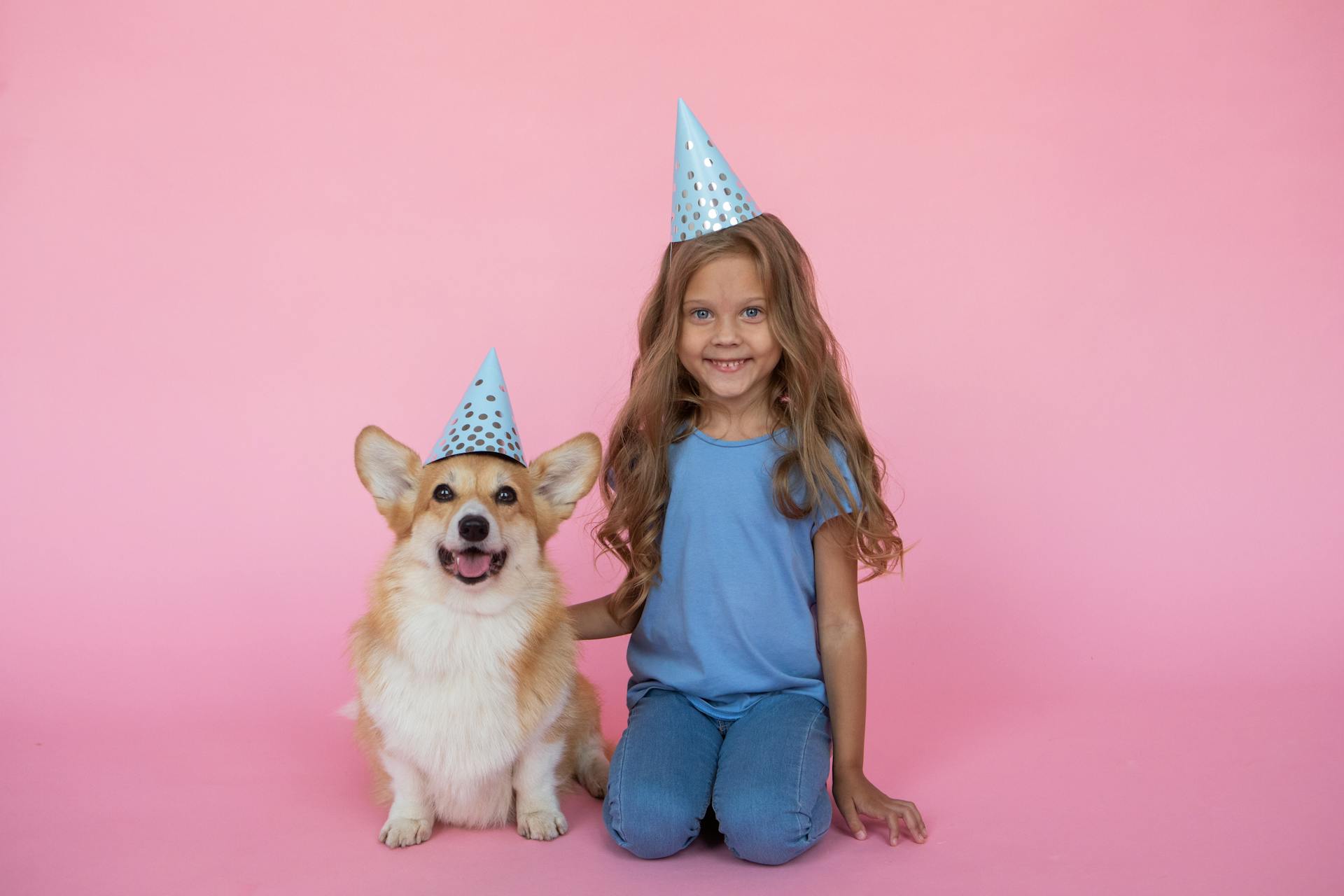
Pembrokes have a remarkable affinity for children, but they do nip at their feet or ankles due to their herding instincts. With proper training, however, this behavior can be trained out of them at a young age.
It's crucial to teach children how to approach and touch dogs gently and to always supervise interactions between dogs and young children. This will prevent any biting or ear or tail pulling on either party.
These dogs are very people-oriented and need to be part of the family at all times, not left alone in the backyard. They thrive on regular attention and affection from their human companions.
Regular grooming sessions are essential to remove dead hair and distribute the coat's natural oils. This not only keeps their plush coat in top condition but also strengthens the bond between the Corgi and its groomer.
Pembrokes are adaptable to living in smaller spaces, provided they receive daily periods of exercise. They can comfortably live in apartments or homes with other animal companions, but introductions should always be properly supervised.
For your interest: Pebroke Welsh Corgi
Is a Pet Right for Me?

Before you bring a Corgi into your life, it's essential to consider whether a pet is right for you. Corgis are friendly, outgoing, and intelligent dogs suitable for owners with different lifestyles.
They don't require a huge amount of space, making them happy in both town and countryside settings as long as they have a small garden to enjoy. Corgis are not considered high-maintenance pets and are relatively easy to care for.
Their small size and moderate exercise needs make them a great choice for first-time owners or families with young children. With regular exercise and grooming, Corgis can thrive in a loving and caring home.
Corgi and Children
Corgis have a remarkable affinity for children, but they do nip at their feet or ankles due to their herding instincts. This behavior can be trained out of them at a young age.
It's essential to teach children how to approach and touch dogs, and to supervise any interactions between dogs and young children to prevent biting or ear or tail pulling. Teach your child never to approach any dog while it's eating or sleeping or to try to take the dog's food away.
Pembroke Welsh Corgis are good with other pets in the household if they have been socialized with them. No dog, no matter how friendly, should ever be left unsupervised with a child.
Discover more: Are Labradoodles Good Dogs
Temperament vs. Personality
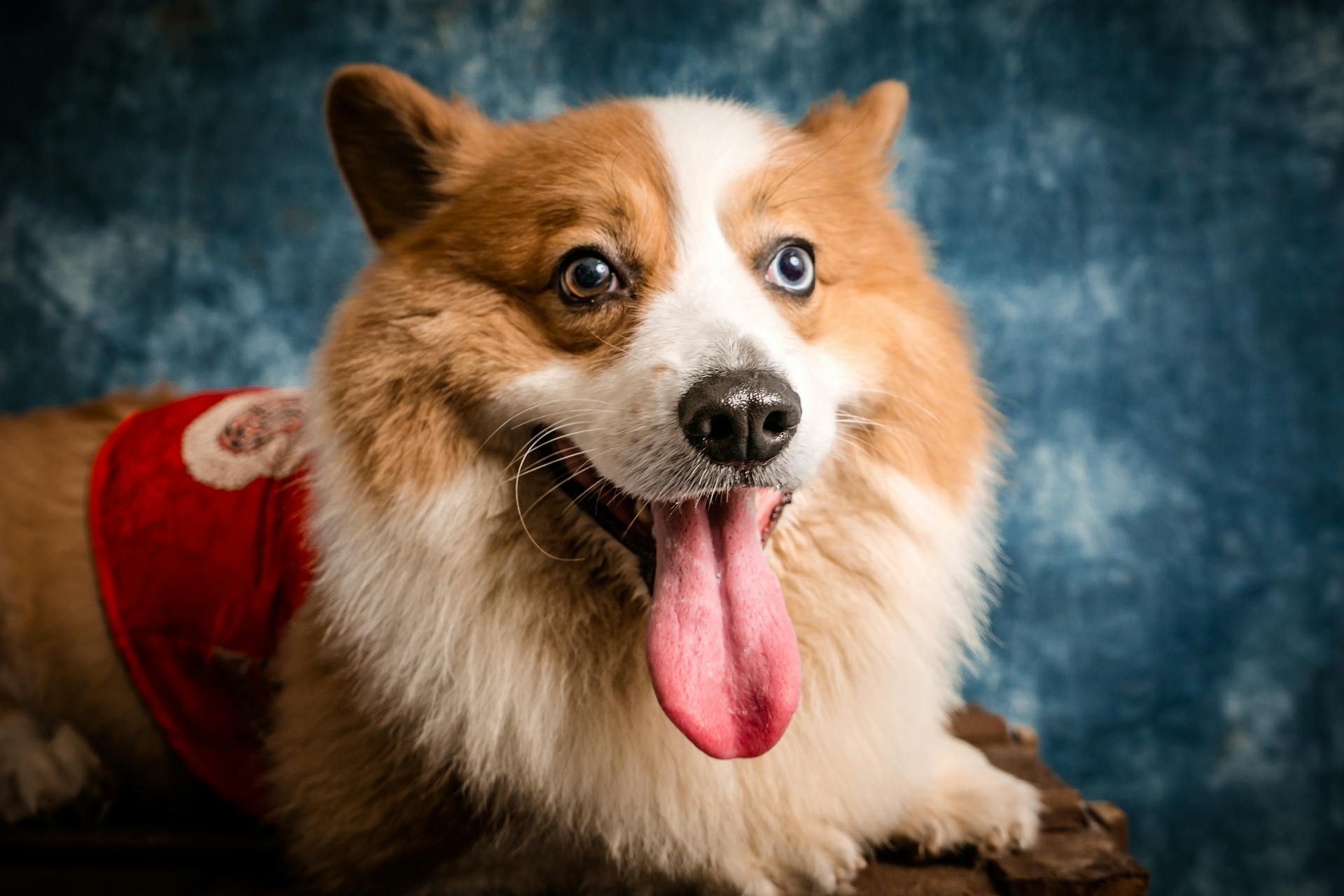
Temperament vs. personality is a crucial distinction to make when considering a Corgi as a family pet, especially if you have kids. A Corgi's temperament is often associated with its breed, but research suggests that breed is only 9% of what determines each animal's behavior.
Proper socialization, training, and upbringing play a much bigger role in shaping a Corgi's temperament. This is why it's essential to consider your Corgi's individual personality and how it's nurtured from an early age.
Corgis are loyal and affectionate dogs that thrive on being part of a pack. They're highly protective of their family, but this doesn't mean they're naturally aggressive. Socialization is key to helping them become open with strangers and not suspicious of everyone.
While some Corgis may be naturally inclined to herd children, this behavior can be managed with proper training and attention. In fact, Corgis can make great additions to families with older kids who know how to care for them and give them the attention they need.
Ultimately, it's essential to understand that a Corgi's temperament is not fixed and can be influenced by their environment and upbringing. By providing a stable and loving home, you can help your Corgi develop a wonderful personality that's perfect for your family.
Explore further: Queen's Corgis Family Tree
Good with Kids?
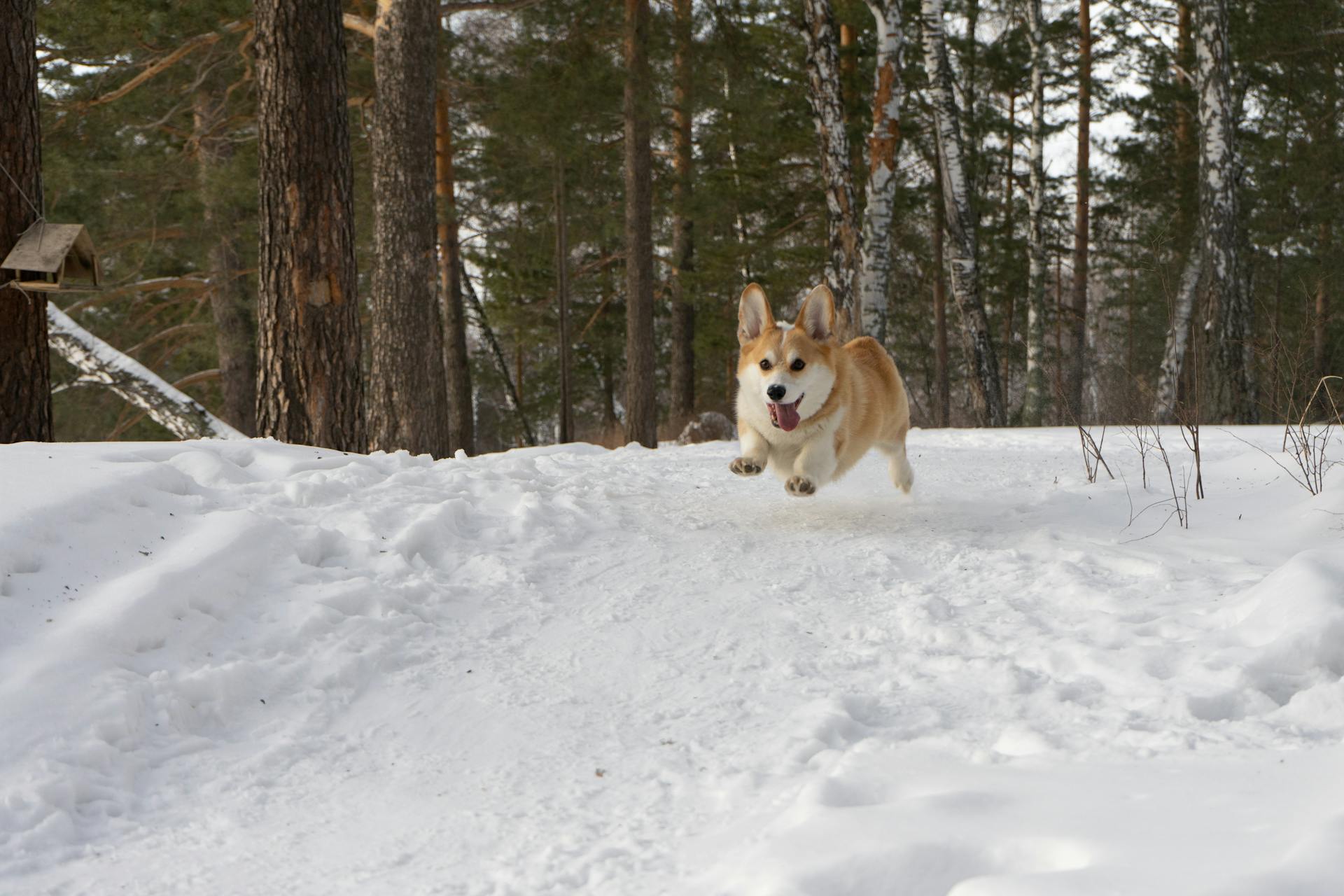
Corgis are generally great with kids, but it's essential to remember that they have a herding mentality, which can sometimes lead to nipping at heels and barking at them.
Introducing Corgis to younger children can be challenging, as they may pick up the herding behavior and nip at their heels. However, with older children who know how to care for them and give them attention, Corgis are a perfect addition to any family.
Corgis are loyal and affectionate dogs, and they thrive on being part of a pack. They form strong bonds with their family members and are highly protective of them.
Socialization is key when it comes to Corgis and children. Proper socialization helps them become open to strangers and less likely to bark at them.
With patience, consistency, and proper training, Corgis can learn to be gentle and calm around children. They are intelligent dogs that respond well to positive reinforcement and rewards.
In fact, the Pembroke Welsh Corgi is an extremely loyal and affectionate dog, including to children, making them an excellent family pet.
See what others are reading: Are Corgis Loyal
Frequently Asked Questions
What are the behavior problems with Corgis?
Corgis can develop behavior problems such as excessive barking and aggression if they don't receive proper training and exercise. Without training, their strong herding instinct can also make them unsuitable for homes with small children
Featured Images: pexels.com

